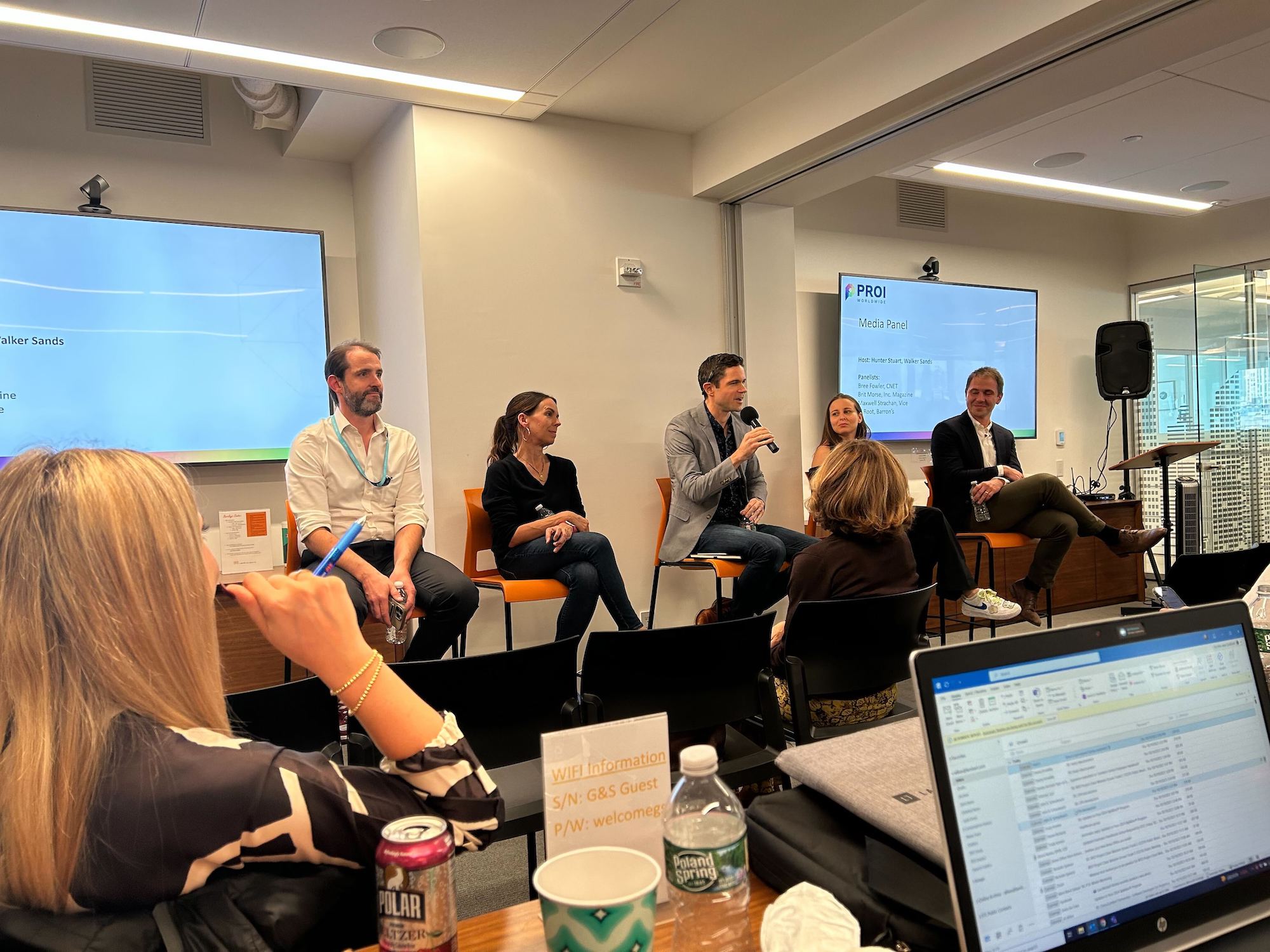Last week, I moderated a panel of journalists at the PROI Americas conference in New York City. Reporters and editors from Barron’s, Inc. Magazine, Motherboard and CNET joined me to talk about the state of journalism, the ways news consumption is changing, misinformation on social media, and (of course) AI.
In the offices of a Manhattan-based agency called G&S Business Communications, the four journalists and I spoke in front of a group of about 50 public relations and communications leaders from dozens of agencies throughout North and South America.
We began the discussion by talking about what makes a good story. Bree Fowler, who covers digital privacy and cybersecurity for CNET, answered it with one word: people.
“Interesting people … and it [a good story] has to have that ‘why do I care’ element,” Fowler said. “Why are you writing this story? If you can’t answer that question, you probably should just cram it into a Tweet and move on.”
Brit Morse, an associate editor at Inc. Magazine, who covers HR, public policy and legal affairs, said she and her team can tell if an idea will make a good story right away. “My editor firmly believes that if you can’t fit a pitch that I’m sending him in two paragraphs, then it’s not a good pitch,” she said.
The conversation quickly turned to the ways news consumption has changed. More Americans than ever are relying on social media as a news source. A third of U.S. adults now get at least some of their news from Facebook, according to research from the Pew Research Center that was published in 2022.
“No one understands the importance of editorial oversight,” Al Root from Barron’s said, referring to the practice of news editors vetting and fact-checking articles before publishing. This, of course, is in contrast to social media posts, which can be immediately published to millions of people with the tap of a finger.
But Root, a senior writer focused on the industrials and automotive sectors, ultimately acknowledged that social media is a necessary evil. “We have to engage on these platforms … partly to generate clicks, partly because it’s just the world we live in,” he said.
Maxwell Strachan, a senior features reporter and editor at Vice’s technology site, Motherboard, added that news publishers have had problems when they rely too heavily on social media networks to distribute their reporting and other content.
“News organizations [are] actually moving away from this as a central strategy,” said Strachan. “The [social media] platforms themselves have deprioritized news, as a result of that, news organizations are trying to be less dependent on those algorithms.”
Social media has obviously contributed to the spread of misinformation. Part of the problem is that too many people believe what they see on Twitter, Facebook, TikTok and WhatsApp without attempting to verify it using another, more reputable source. According to Pew Research, adults under 30 are now almost as likely to trust information from social media sites as they are to trust information from national news outlets.
Morse, the Inc. reporter, said journalists have a responsibility to debunk fake news online. She named The New York Times and The Washington Post as two news outlets doing a good job exposing the falseness of claims that multiply quickly on social platforms.
“You see them [these news outlets] pointing out misinformation that has been spread,” Morse said. “As journalists, we can definitely do that. If there are people in this world that should be pointing out what misinformation on the Internet is being spread, shouldn’t we be doing that?”
Misinformation online may proliferate now that generative AI tools like ChatGPT are widely available. But AI is causing a different kind of problem in the journalism industry: job cuts. Some media outlets have already reduced staff after “replacing” them with AI. Buzzfeed, Gannett, Fortune and other news organizations are already experimenting with AI as a way to either produce content or to reduce the “grunt work” journalists perform. As Fowler from CNET pointed out, The Associated Press has used AI for years to write earnings reports, so in some ways, this is old wine in a new bottle. (Fowler was an AP reporter for 16 years.)
But Strachan, the Motherboard editor, said he thinks AI may be a positive thing for the industry in some ways.
“I think it [AI] will cause boring journalism jobs to get cut out,” he said. “I think it will reemphasize what humans can do. A human can interview someone, a human can uncover information that a robot cannot. Regurgitation, what used to be called aggregation – that can probably be done by AI or machine learning. I don’t think journalists will miss those [jobs]. I think the typical journalism job can become more fun, and have more of the good stuff as a result.”
Thank you to all of the panelists for joining me and offering your insights on these important topics.
At Walker Sands, we have deep expertise in navigating the evolving media landscape to ensure our clients earn coverage that drives brand awareness and credibility. Start a conversation with our media relations experts to see how we can help your company reach its public relations goals.




